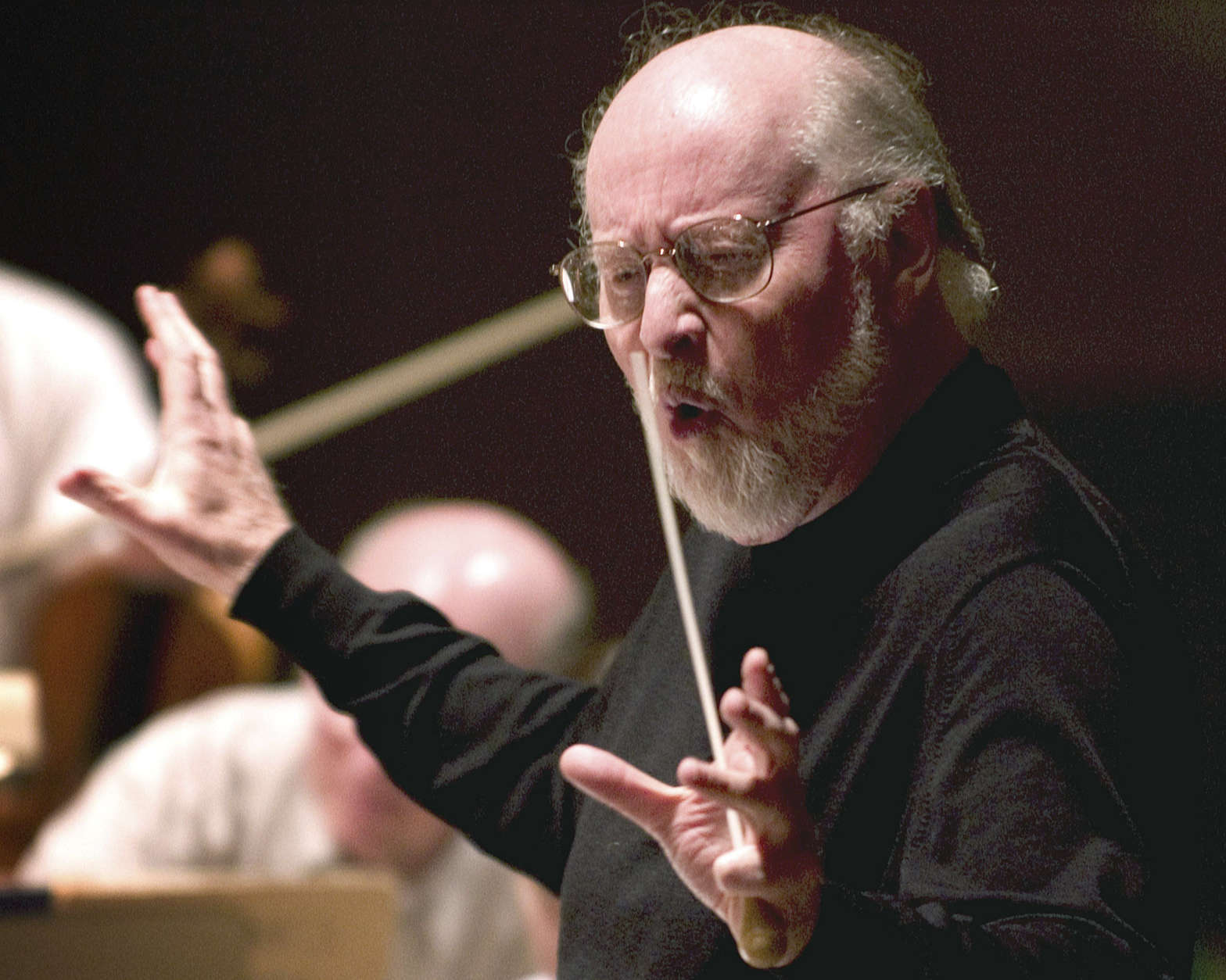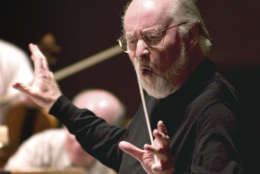

WASHINGTON — He’s earned 50 Oscar nominations over his legendary career.
This weekend, “The Music of John Williams” will be performed live at the Kennedy Center by the National Symphony Orchestra and Choral Arts Society of Washington from Thursday to Saturday.
“In my estimation, John Williams is the finest film composer living today,” NSO Pops conductor Steven Reineke told WTOP. “He really is a living legend. He’s the granddaddy of film music. … [He’s earned] 50 Academy Award nominations. … That’s by far more than any other living person and only second in history. Only Walt Disney has more Oscar nominations with 59, so it’s pretty impressive.”
Not only have his themes become pop-culture staples, they’re equally respected in highbrow circles.
“He utilizes a full symphony orchestra,” Reineke said. “He’s one of the guys [who] bridges the gap from the Golden Age of Hollywood when you had Bernard Herrmann, Miklós Rózsa, Nino Rota, [Erich Wolfgang] Korngold, [Franz] Waxman, most of them with European backgrounds who were writing classical symphonic music, and John does the same thing. … A lot of times, you’ll get a contemporary pop score or synthesized electronics, but John is just the old-school, European, orchestral sound.”
The program will open with Williams’ Oscar-winning score from Steven Spielberg’s “Jaws” (1975).
“John’s scored all of Spielberg’s movies except for two, so we’re going to start where it all began,” Reineke said. “It’s so scary, so menacing. I just love starting a John Williams program this way. … You hear that low rumble, ‘ba-dum, ba-dum,’ two notes! Then it just keeps building up steam, volume, momentum. It’s truly something out there in the dark depths of the ocean churning its way to you.”
After that, get ready for Williams’ “Call of the Champions” from the 2002 Olympics in Salt Lake City.
“I’m doing it because it utilizes this grand chorus we’ll have with us,” Reineke said. “John wrote it for the Mormon Tabernacle Choir and it is such an exciting piece of music. … I’ll be sweating after that!”
It’s one of several lesser-known works that Reineke will highlight. Rather than play only the hits — don’t expect “Close Encounters of the Third Kind” (1977), “Superman” (1978), “Raiders of the Lost Ark” (1981), “Home Alone” (1990), “Jurassic Park” (1993) or “Schindler’s List” (1993) — Reineke instead wanted to highlight the hidden gems from Williams’ career, including “War Horse” (2011).
“I just don’t want to repeat everything all the time, so I had to pick and choose some other movies, some of which I think are underrepresented,” Reineke said. “‘War Horse’ has an absolutely brilliant score and we’re doing a track from it called ‘Dartmoor, 1912.’ It is so quintessentially English. … You can see these horses running in a field on an English countryside. It is such a throwback to some of the great British composers, but also with John’s sense of Americana thrown into it. It’s so visual.”
Along similar lines, get ready for Williams’ quiet, evocative, beautiful score from “Lincoln” (2012).
“There’s a special track called ‘The People’s House’ from the movie ‘Lincoln,’ which is an absolutely gorgeous piece of music,” Reineke said. “It’s a little more on the sedated side, but it’s got this grand, stately manner about it. Of course, the People’s House is the White House. It just has this wonderful sense of grandeur and reverence to it and, again, an early Americana sort of feel, a la Aaron Copland.”
Reineke will salute another Spielberg-Williams historical drama with “Saving Private Ryan” (1998).
“One of my absolutely favorite pieces of music is from ‘Saving Private Ryan’ called ‘Hymn to the Fallen,'” Reineke said. “It utilizes a chorus and it’s a very, very special [piece]. It’s a real tear-jerker.”
Reineke will then turn to the magic and wonder of Williams’ theme for “Harry Potter” (2001-2011).
“We’ll be doing ‘Harry’s Wondrous World,’ the big main theme from the very first movie,” Reineke said. “Then, there’s a great choral piece called ‘Double Trouble’ from ‘Harry Potter & The Prisoner of Azkaban,’ the third film, so we’ll utilize that featuring the [Washington Choral Arts Society] chorus.”
The first half of the program closes with the “Flying Theme” from “E.T. The Extra Terrestrial” (1982).
“There’s an amazing Hollywood story [where] they’re in the studio and John’s conducting the movie, Steven Spielberg is there, and it just wasn’t quite lining up exactly the way that they wanted it to,” Reineke said. “So, Spielberg did something unprecedented. He said, ‘John, your music is so incredible here, I’m turning off the movie, you just conduct it the way you wrote it, the way you want to hear it. Then Spielberg recut that entire scene to fit John’s music, as opposed to the other way around!”
After a brief intermission, get ready for an entire second act devoted to “Star Wars” (1977-2017).
“All of Act Two is ‘Star Wars!’ Reineke exclaimed. “We have ‘A New Hope,’ ‘Phantom Menace,’ ‘Attack of the Clones,’ ‘Revenge of the Sith,’ ‘The Empire Strikes Back,’ ‘Return of the Jedi’ and ‘The Force Awakens,’ all in that order. I have chosen at least one selection from each of the big seven episodes of the ‘Star Wars’ saga. I’m presenting them in [rough] chronological order, not the order they came out.”
By the end, you’ll have taken a nostalgic journey that enhances your appreciation for film scores.
“You’re going to hear the incredible National Symphony Orchestra and the brilliant Choral Arts Society bring this music to life that’s like a soundtrack to our lives,” Reineke said. “Anybody who’s a moviegoer, these themes are so recognizable, but you’ve never heard them played this way before. The power that you’re going to feel is so different from when you’re watching the movie. To hear it done live, you really understand the intricacy of the music and hear and feel the passion behind it.”
Click here for more information. Listen to our full chat with NSO conductor Steven Reineke below:







